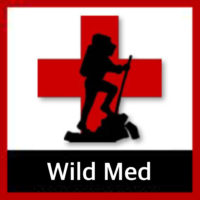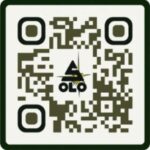Next class is Apr 18th-19th, 2026 — Sign-up below
Activity Description
 Of all the skillsets hikers and other outdoor enthusiasts may possess, backcountry medical training is perhaps the epitome of value. If you hike and spend time in remote locations outside of the “golden hour” (meaning an hour or more from typical urban medical services), dealing with injury or illness at some point — even if it’s not your own — is likely. Getting the proper training will prepare you for this unwelcome eventuality and an appropriate backcountry medical response. And do know this: we strongly encourage preparedness. On this page we are offering SOLO-run Wilderness First Aid (WFA, or said as “WooFAh”) courses, plus CPR/AED. These courses also qualify for Wilderness First Responder (WFR, or said as “WooFeR”) recertification, though an extra fee of $15 applies.
Of all the skillsets hikers and other outdoor enthusiasts may possess, backcountry medical training is perhaps the epitome of value. If you hike and spend time in remote locations outside of the “golden hour” (meaning an hour or more from typical urban medical services), dealing with injury or illness at some point — even if it’s not your own — is likely. Getting the proper training will prepare you for this unwelcome eventuality and an appropriate backcountry medical response. And do know this: we strongly encourage preparedness. On this page we are offering SOLO-run Wilderness First Aid (WFA, or said as “WooFAh”) courses, plus CPR/AED. These courses also qualify for Wilderness First Responder (WFR, or said as “WooFeR”) recertification, though an extra fee of $15 applies.
Special Information
These Wilderness First Aid courses are different than our typical, completely customizable offerings, in the following ways:
- » To individuals, these courses are only available during certain times. Please check our Available WFA/CPR Course Dates (scrollable pop-up).
- » These courses have a minimum participant count of twelve (12) students, and are thus contingent upon those requirements being met.
- » The minimum age for the WFA is 12 years old with a paying adult, or 16 years old without accompaniment (only mature students need apply).
- » These courses are taught by highly-qualified and very personable instructors from the SOLO School of Wilderness Medicine.
- » Custom scheduling may be available to self-formed groups of 10 or more. To secure a private group course at your location, contact us.
Activity Offerings
Redline Guiding, along with Wild Raven Endurance Coaching, is offering 16-hour SOLO WFA (Wilderness First Aid) courses held at the AMC’s Joe Dodge Lodge in Pinkham Notch. Students will be issued textbooks to keep and morning refreshments served. These are 8am-5pm weekend courses with the 5-7pm CPR component coming right after day one’s regular class. There is testing at the end of day two (those doing this for WFR recertification get a separate test), followed by the issuance of the applicable credentials and a huge after-party (kidding about the party). In either case — WFA or WFR Re-cert, the following subject matter is covered in depth.
Wilderness First Aid (WFA)
Click here to reveal the full list of the topics covered in this comprehensive course.
Wilderness First Aid (WFA)
Click here to HIDE the full list of the topics covered in this comprehensive course.
- Introduction to WFA.
- What is Wilderness First Aid?
- Anatomy of a Wilderness Crisis.
- Scene Safety.
- Bodily Substance Isolation (BSI).
- Anatomy of the Musculoskeletal System.
- Asthma.
- Backcountry Essentials.
- Cold-Related Injuries.
- Environmental Emergencies & Survival Skills (including lightning).
- Heat-Related Injuries.
- Medical Emergencies & Critical Care.
- Orthopedics.
- Patient Assessment System.
- Patient Lifting & Moving.
- Principles of Fracture Care.
- Rescue Plan.
- Response & Assessment.
- S.O.A.P. Note.
- Soft Tissue Injuries & Medical Emergencies.
- Spinal Cord Injury Management.
- Sprains & Strains.
- Techniques.
- The Human Animal.
- Trauma-Musculoskeletal Injuries.
- Trauma-Soft Tissue Injuries.
- Universal Precautions.
- Use of Epinephrine.
- And more…
WFR Recertification
 Please note that WFR Recertification is required every three years and is an option for SOLO graduates only during our WFA classes. There is no additional fee. To sign up for a WFR recertification please start with this link or scan the QR code (right).
Please note that WFR Recertification is required every three years and is an option for SOLO graduates only during our WFA classes. There is no additional fee. To sign up for a WFR recertification please start with this link or scan the QR code (right).
Meals and Lodging Info
Meals and lodging are available on-site from the AMC’s (Appalachian Mountain Club) Joe Dodge Lodge and Pinkham Notch Visitor Center. If you’re participating in these courses, a discount of 20% may be available. To take advantage of this discount and the convenience staying there offers, please mention this to the kind folks over in AMC Reservations. Please call them at 603-466-2727 to book your space or do it online. Lunches are available to purchase from the AMC or you may bring your own. Other feasible lunch options exist, but will involve time and travel forcing you to rush. This is also true of other meals if staying on location and are included with your AMC lodging.
What to Wear
You should plan to wear or have with you clothing that will be appropriate to the season and location of your course (elev. 2028′). Weather permitting, you will be spending a significant portion of the class time out-of-doors — even on the ground. You will be using your equipment to provide care, build splints, and to keep yourself and others warm. Please note, SOLO instructors use moulage (mock injury makeup) throughout the training that can stain some clothing, therefore, you may want to bring older or darker clothing to wear for training scenarios.
- Think layers. You will want to dress in layers so you can easily adjust and adapt to the requirements of the situation. The layers you choose should probably consist of fast-drying synthetics, or insulating fabrics like wool or fleece. Cotton/denim fabric shouldn’t be used. Moreover, your articles should be durable. Wearing older clothing is advised to prevent damage to your good stuff.
- Extras in a pack. Since layers in your pack may be used to pad a splint, bring extras for said purpose. And of course this means you’ll need a pack or bag to carry them in. See the gear requirements below.
- For footwear. In the warmer months you can wear hiking boots or sturdy hiking shoes (no “Five Fingers” shoes please). In the colder months you will want winter-rated hiking boots as a minimum.
Necessary Gear
For these courses, there really is only one gear option available. Click to expand.
WFA Gear Requirements - Open
WFA Gear Requirements - Close
The following list is to supplement the clothing you will be wearing (see “What To Wear,” above) and is to be considered a minimum. You are free to supplement it with anything else you would normally carry.
Required Items
The following items are required by SOLO to be packed for each class, adjusted for the weather conditions and forecast:
- Pack to put everything in (25L or larger).
- Rain gear jacket and pants (no ponchos).
- 1 hat, as needed by weather (synthetic or wool).
- 1 pair gloves or mittens, as needed by weather (synthetic or wool).
- Base layers, as needed by weather (synthetic or wool).
- Warm top and bottom layer, as needed by weather (synthetic or wool).
- 1 pair socks, as needed by weather (synthetic or wool).
- 1 water bottle (1 liter/quart or larger).
- Temporary COVID-19 Related Gear:
- Face mask (cloth, surgical, N95, or KN95). Needs to fully cover your nose, mouth, and chin.
- Eye protection (glasses, goggles, face shield). Sunglasses are okay, but for outdoor use only.
Recommended Items
The following items are recommended by SOLO to be packed for each class:
- Notebook with pen/pencil.
- Watch with second hand (or digital with seconds).
- Insect repellent (in season).
- Sunglasses and sunscreen.
- 4’x6′ 4-6 mil. plastic tarp (as a ground cloth).
- Foam sleeping pad.
- Bandanas/cravats of any kind.
Okay… Let’s Do This!
Here is the pricing and other information you’ll probably want to know. To register, please fill out the form below.
| WFA Course Pricing | |
|---|---|
| Single WFA Seat | $295/person |
| Premium WFA Options | |
| Single CPR/AED Seat | Add $95 to total |
| Single CPR/AED ONLY | Each $105/seat |
| Single WFR Re-cert. | No additional charge |
Other Information
- The difficulty of this activity is easy.
- This activity has a 1:24 instructor/student ratio.
- The maximum group size is 24 with 1 instructor.
- Larger class sizes for private groups may be accommodated. Ask.
- Deposits are non-refundable inside of 60 days from date of class.
Use the form below to register for these classes — click link for Available WFA/CPR Course Dates

